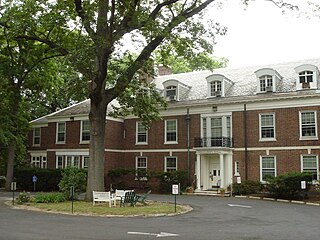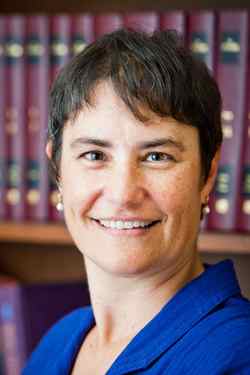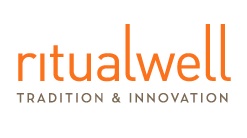Related Research Articles

Judaism is an Abrahamic monotheistic ethnic religion that comprises the collective spiritual, cultural, and legal traditions of the Jewish people. Along with Samaritanism, to which it is closely related, Judaism is one of the two oldest Abrahamic religions.

Mordecai Menahem Kaplan was an American Modern Orthodox rabbi, writer, Jewish educator, professor, theologian, philosopher, activist, and religious leader who founded the Reconstructionist movement of Judaism along with his son-in-law Ira Eisenstein. He has been described as a "towering figure" in the recent history of Judaism for his influential work in adapting it to modern society, contending that Judaism should be a unifying and creative force by stressing the cultural and historical character of the religion as well as theological doctrine.

Reconstructionist Judaism is a Jewish movement based on the concepts developed by Rabbi Mordecai Kaplan (1881–1983) that views Judaism as a progressively evolving civilization rather than just a religion. The movement originated as a semi-organized stream within Conservative Judaism, developed between the late 1920s and the 1940s before seceding in 1955, and established a rabbinical college in 1967. Reconstructionist Judaism is recognized by many scholars as one of the five major streams of Judaism in America alongside Orthodox, Conservative, Reform, and Humanistic.

Women in Judaism have affected the course of Judaism over millenia. Their role is reflected in the Hebrew Bible, the Oral Law, by custom, and by cultural factors. Although the Hebrew Bible and rabbinic literature present various female role models, religious law treats women in specific ways. According to a 2017 study by the Pew Research Center, women account for 52% of the worldwide Jewish population.

A siddur is a Jewish prayer book containing a set order of daily prayers. The word siddur comes from the Hebrew root ס־ד־ר, meaning 'order.'

The machzor is the prayer book which is used by Jews on the High Holy Days of Rosh Hashanah and Yom Kippur. Many Jews also make use of specialized machzorim on the three pilgrimage festivals of Passover, Shavuot, and Sukkot. The machzor is a specialized form of the siddur, which is generally intended for use in weekday and Shabbat services.

The Reconstructionist Rabbinical College (RRC) is a Jewish seminary in Wyncote, Pennsylvania. It is the only seminary affiliated with Reconstructionist Judaism. It is accredited by the Commission on Higher Education of the Middle States Association of Colleges and Schools. RRC has an enrollment of approximately 80 students in rabbinic and other graduate programs.
Siddur Sim Shalom refers to any siddur in a family of siddurim, Jewish prayerbooks, and related commentaries, published by the Rabbinical Assembly and the United Synagogue of Conservative Judaism.
The Germantown Jewish Centre is a Conservative synagogue and community centre located in the Mount Airy neighborhood of Philadelphia, Pennsylvania, in the United States. Established in 1936, the synagogue is affiliated with the United Synagogue of Conservative Judaism.

Arthur Green is an American scholar of Jewish mysticism and Neo-Hasidic theologian. He was a founding dean of the non-denominational rabbinical program at Hebrew College in Boston. He describes himself as an American Jew who was educated entirely by the generation of immigrant Jewish intellectuals cast up on American shores by World War II.
Michael Strassfeld is an American rabbi. Strassfeld was rabbi of the Society for the Advancement of Judaism, a Manhattan synagogue. Before that he was the rabbi of Congregation Ansche Chesed.
The Reconstructionist Rabbinical Association (RRA) founded in 1974, is the professional association of rabbis affiliated with Reconstructionist Judaism. It has approximately 300 members, most of whom are graduates of the Reconstructionist Rabbinical College (RRC) in Wyncote, Pennsylvania, near Philadelphia. The RRA is a member of a number of national coalitions including the Conference of Presidents of Major American Jewish Organizations. Its first director was Rabbi Richard Hirsh who was hired in 1984 to work five hours/week when he was dean of admissions at RRC.
Pesukei dezimra, or zemirot as they are called in the Spanish and Portuguese tradition, are a group of prayers that may be recited during Shacharit. They consist of various blessings, psalms, and sequences of other Biblical verses. Historically, reciting pesukei dezimra in morning prayer was a practice of only the especially pious. Over the course of Jewish history, their recitation has become widespread custom among all of the various rites of Jewish prayer.
Jacob J. Staub is a rabbi, author and poet. In 1977 he was ordained as a rabbi at the Reconstructionist Rabbinical College. He was Academic Dean of the College from 1989 to 2004, and the editor of the Reconstructionist magazine from 1983 to 1989. In 2009 he was Professor of Jewish Philosophy and Spirituality and Chair of the Department of Medieval Jewish Civilization at the Reconstructionist Rabbinic College. He founded at RRC the first program in Jewish Spiritual Direction at a rabbinical seminary. He has written two books on Gersonides' philosophy of creation and Reconstructionist Judaism. He has written essays on Mordecai Kaplan's thought.

Rabbi Jason Klein is the Senior Rabbi of Congregation Beit Simchat Torah.

Deborah Waxman is an American rabbi and the president and CEO of Reconstructing Judaism. Waxman was inaugurated as the president of both on October 26, 2014. The ceremony took place at the National Museum of American Jewish History in Philadelphia. Waxman is believed to be the first woman rabbi and first lesbian to lead a Jewish congregational union, and the first lesbian to lead a Jewish seminary; the Reconstructionist Rabbinical College is both a congregational union and a seminary. She previously served as the vice-president for governance for the Reconstructionist Rabbinical College. In 2015 she was named as one of The Forward 50.

Ritualwell is a website that allows users to find, create and share Jewish rituals. It was initially launched in 2001 and was nominated for a Webby Award in the Religion & Spirituality category in 2003. The site was redesigned and relaunched in 2005. It seeks to "increase the number of rituals available for holidays, Shabbat and traditional lifecycle events.
Or Haneshamah, officially, Or Haneshamah – Ottawa's Reconstructionist Community, is a Jewish Reconstructionist synagogue located in Ottawa, Ontario, Canada. The congregation is one of only three affiliated Reconstructionist congregations in Canada, and the only Reconstructionist congregation in Ottawa. Founded in 1987, Or Haneshamah describes itself as a progressive, liberal, egalitarian, inclusive, multi-generational congregation notable for welcoming all Jews, including unaffiliated, intermarried, and LGBTQ individuals and families. As of 2016, the congregation's membership constituted approximately 90–100 households.
Shefa Gold is an American rabbi, scholar, and Director of the Center for Devotional, Energy and Ecstatic Practice (C-DEEP) in Jemez Springs, New Mexico. Gold is a teacher of chant, Jewish mysticism, Jewish prayer and spirituality who Rabbi Mike Comins described in 2010 as "a pioneer in the ecstatic practice of Jewish chant." Her chants have been used in synagogues, minyanim, and street protests; perhaps her most well known being "Ozi V'zimrat Yah". Combining traditional Jewish liturgical music with Hebrew chant, Gold has worked to cultivate a distinctly Jewish gratitude practice. Her "Flavors of Gratefulness" mobile app has 109 different chants for Modeh Ani, the brief prayer traditionally recited by religious Jews upon awakening. In 2024 she released "Flavors of Praise" with 61 different chants.
Elizabeth (Liz) Bolton is a rabbi, feminist, and activist. Hired in 2013 by Reconstructionist synagogue Or Haneshamah, she is Ottawa’s first female and openly gay rabbi. In the late 1980’s, she led efforts to address the exclusion of women from the cantorate in Canada.
References
- 1 2 Walsh, James (August 22, 1974). "Valley congregation builds a do-it-yourself synagogue". The Journal News. p. 17.
- ↑ Wirsing, Whit (June 9, 1973). "New clergymen see renewal, regeneration of religious faith". Deseret News. p. 4.
- 1 2 Ross, Gabe (January 18, 2007). "Toward an ethical life". Washington Jewish Week. pp. 8–9. ProQuest 220855790.
- 1 2 3 4 5 6 Mono, Brian (March 29, 2001). "RRC President to Explore Other Scholarly Pursuits". The Jewish Exponent. p. 8. ProQuest 227261428.
- ↑ "Jewish movement at crossroads". St. Joseph News-Press. January 14, 1984. p. 17.
- 1 2 Magida, Arthur J. (March 26, 1993). "Changing of the Guard In Reconstructionism: David Teutsch is the Reconstructionist Rabbinical College's fourth president". Vol. 210, no. 4. Baltimore Jewish Times. p. 50. ProQuest 222857488.
- ↑ Kenna, Eileen (April 1, 1990). "Rabbinical College Accredited; Advantages Seen for Students". The Philadelphia Inquirer. p. H25. ProQuest 1834824637.
- 1 2 Lazarus, David (August 7, 1997). "Reconstructionist Judaism growing by leaps and bounds". Canadian Jewish News. p. 22. ProQuest 351357114.
- 1 2 Nathan-Kazis, Josh (December 11, 2009). "Madoff: A Year Later". The Forward. ProQuest 367929961.
- ↑ Palmer, Joanne (March 31, 2005). "Halachah sheds light on Schiavo case". Canadian Jewish News. ProQuest 351485431.
- ↑ DelReal, Jose A.; Zauzmer, Julie (July 8, 2016). "Trump's vigorous defense of anti-Semitic image a 'turning point' for many Jews". The Washington Post .
- ↑ Sommer, Allison Kaplan (November 30, 2022). "Israel's Far-right Coalition Presents Unprecedented Challenge to U.S. Jews". Haaretz.
- 1 2 Silverstein, Marilyn (April 22, 1994). "New Siddur: Entering prayer through both head and heart". The Jewish Exponent. p. 6. ProQuest 227242140.
- 1 2 Spiro, Suzanna (June 30, 1994). "You Won't Find 'The Lord' in this Prayerbook: New Reconstructionist prayerbook draws texts from numerous sources". Deerfield Beach, FL: Jewish Journal. p. 1B. ProQuest 367554838.
- 1 2 3 "Reconstructionists Debut Book". The Forward. September 3, 1999. p. 21. ProQuest 367703631.
- ↑ Schwartzman, Bryan (January 19, 2012). "Jewish Book Awards Have Two Local Ties". The Jewish Exponent. p. 13. ProQuest 919590107.
- ↑ Friedland, Eric L. (July 1990). "Let Every Living Thing Yah's Praises Sing". Judaism. 39 (3): 338–344. ProQuest 200392854.
- ↑ Greene, Wallace (January 10, 2012). "Review: Guide to Jewish Practice: Volume 1 - Everyday Living". Jewish Book Council.
- ↑ Bible, Barbara M. (October 14, 2014). "Review: Guide to Jewish Practice: Volume 2 - Shabbat and Holidays". Jewish Book Council.
- ↑ "Related Resources | Before Google, before Wikipedia, this DIY almanac shaped a Jewish generation". www.reconstructingjudaism.org. February 15, 2023. Retrieved October 28, 2024.